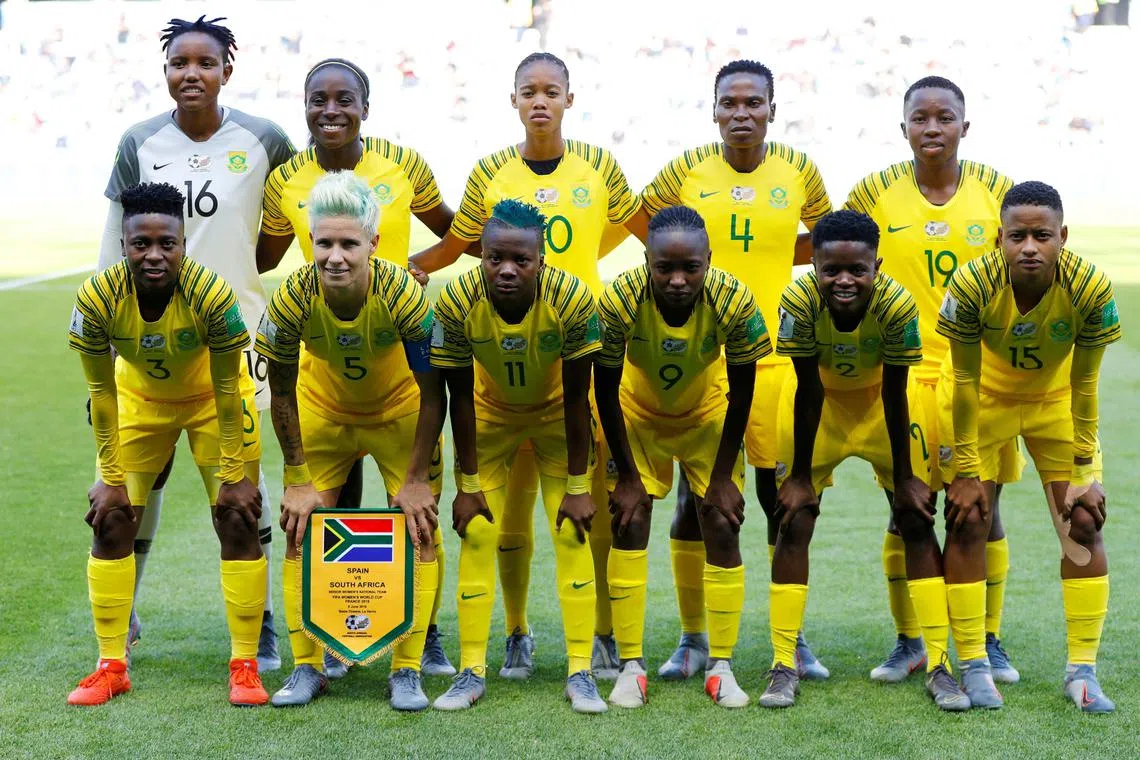South Africa women footballers called ‘mercenaries, traitors’ amid boycott
Sign up now: Get the biggest sports news in your inbox

South Africa women's football team lost to Spain, China and Germany at the 2019 World Cup.
PHOTO: REUTERS
Follow topic:
JOHANNESBURG – The South Africa women’s World Cup team were called “mercenaries” and “traitors” on Sunday as they boycotted a warm-up against Botswana ahead of the upcoming global showpiece.
Banyana Banyana (The Girls) said the match venue in the Tsakane township, 50km south-east of Johannesburg, was unsuitable for international football.
They believed playing on a surface of clay and grass could lead to injuries,
South Africa also wanted to play their final preparatory game before flying to Oceania at a more prestigious venue like Soccer City in Johannesburg or Orlando Stadium in Soweto.
Football officials called up players, including a 13-year-old, from a local league and delayed the kick-off by one hour before Botswana exploited their inexperienced rivals to win 5-0.
The result against opponents ranked 96 places below South Africa was a major embarrassment, as World Cup squad members said before the boycott that they wanted stronger opponents.
A senior South African Football Association (Safa) official, who requested anonymity, told the weekly City Press the players were behaving like “mercenaries” and “traitors”.
Apart from the venue and opposition, Banyana are unhappy with the financial arrangements ahead of the World Cup, where they will face Sweden, Argentina and Italy in Group G.
According to the players, they will receive US$30,000 (S$40,500) each from Fifa for being at the World Cup, but nothing from Safa.
Banyana reacted by refusing to sign pre-tournament contracts, saying they wanted an additional US$21,000 per player from the national association, according to reports.
Safa chief financial officer Gronie Hluyo said: “The players are being unreasonable in their demands.
“What Fifa has committed to giving them is way more than we have committed to any of the national teams previously, including Bafana Bafana (men’s senior national team).”
Hluyo said each player received 20,000 rand (S$1,441) for competing at the 2019 World Cup in France, where South Africa lost to Spain, China and Germany.
The men’s team have not featured at the World Cup since South Africa hosted the tournament in 2010.
“What they are getting now is way more than that, but they are still not happy,” added the official.
The venue and bonus drama came one week after reports of a chaotic function in Pretoria during which the World Cup squad was named.
Some political invitees did not turn up for an event screened live on public broadcaster SABC, the sound system malfunctioned and stage screens remained blank.
Banyana Banyana are due to leave for New Zealand in two groups, on Wednesday and Thursday, and play Costa Rica in a final warm-up before tackling Sweden in Wellington on July 23.
Meanwhile, Matildas captain Sam Kerr said on Monday that Australia would like to wear the OneLove multi-coloured armband in support of LGBTQ rights at the Women’s World Cup, but it is not worth risking the co-hosts’ tournament.
Irish media reported Katie McCabe had been denied permission by global governing body Fifa to wear the OneLove armband when captaining Ireland at the tournament.
The OneLove armbands were not allowed at the men’s World Cup in Qatar in 2022. Fifa has instead sanctioned eight armbands with messages about inclusion, gender equality and peace for the women’s tournament.
“We would love to wear them,” Matildas striker Kerr said in Melbourne on Monday of the OneLove armband. “Like most of the teams in the whole world, everyone has voiced that they would love to wear it.”
However, Kerr said the threat of an on-field sanction would keep her from wearing one.
“You saw with the men’s World Cup – Harry Kane, for example. First game if he had have worn it, (he would have received) a yellow card – he got a yellow card in the game, so he would have been sent off,” she said of the England captain.
“It’s not worth the risk – putting the team at risk, putting the tournament at risk, putting everything at risk.
“There will be multiple opportunities where we get to use our voice and there’ll be multiple opportunities where I get to use my voice for things.” AFP, REUTERS

